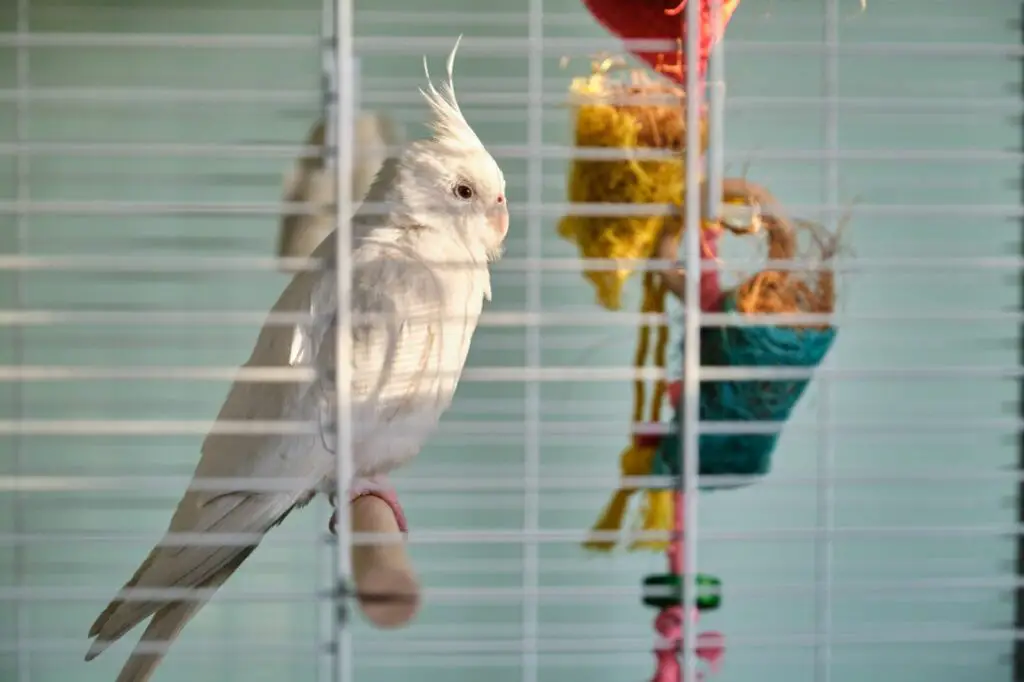Cockatiels are social, intelligent, and loving birds that make great pets. However, like other animals, they can display aggressive behavior towards their own kind.
I have seen many bird owners come to me with concerns about their cockatiels fighting. In this blog post, I will discuss the reasons why cockatiels fight, how to recognize signs of aggression, and offer tips on how to prevent and manage cockatiel aggression.

Why do Cockatiels Fight?
Understanding Cockatiel Behavior
Cockatiels are flock birds and enjoy living in groups, but they can also become territorial and aggressive. They use their body language, vocalizations, and behavior to communicate with each other. They may also fight for dominance, attention, or resources like food, water, or toys.
Common Causes of Cockatiel Aggression
1. Lack of space: Birds need enough space to move around, play, and exercise. If they are cramped in a small cage, they may become stressed and aggressive towards each other.
2. Inadequate resources: If there is not enough food, water, or toys to go around, birds may become aggressive towards each other to compete for these resources.
3. Hormonal changes: Cockatiels may become more aggressive during breeding season or when they are going through hormonal changes.
4. Socialization: If cockatiels are not properly socialized, they may develop aggressive behavior towards other birds.
Recognizing Signs of Aggression
Body Language and Vocalizations
Cockatiels may display a range of body language signs when they are feeling aggressive, such as:
1. Fluffing up their feathers
2. Spreading their wings
3. Lunging or attacking the other bird
4. Squawking or screeching
5. Biting or pecking
Aggression Between Same-Sex and Opposite-Sex Cockatiels
Aggression can occur between both same-sex and opposite-sex cockatiels, but it is more common between males. Male cockatiels may fight over territory or a female mate. Female cockatiels may also become aggressive during breeding season.
Preventing Cockatiel Aggression
Setting Up the Cage
To prevent cockatiel aggression, it is important to provide them with a spacious cage that has plenty of perches, toys, and feeding stations. The cage should be big enough to allow each bird to have its own space and avoid territorial disputes.
Providing Adequate Space, Toys, and Activities
Cockatiels need plenty of space outside their cage to exercise and play. They also need toys and activities to keep them entertained and mentally stimulated. Providing them with a variety of toys, like swings, mirrors, and chew toys, can help prevent boredom and aggression.
Feeding and Nutrition
Feeding your cockatiels a balanced and nutritious diet can also help prevent aggression. A diet that is high in protein, vitamins, and minerals can help keep them healthy and reduce stress. Additionally, providing separate feeding stations can help prevent competition for food.
Managing Cockatiel Aggression
Separating Aggressive Birds
If you notice that your cockatiels are displaying aggressive behavior towards each other, it is important to separate them. This can be done by providing separate cages or placing dividers inside the cage.
Training and Socialization
Proper socialization and training can also help prevent and manage cockatiel aggression. Spend time with your birds, interact with them, and provide positive reinforcement when they display good behavior.
Working with a Professional
If you are unable to manage your cockatiel’s aggression on your own, it may be helpful to seek the assistance of a professional bird trainer or veterinarian. They can provide you with specialized advice and techniques to manage your bird’s aggression.
Conclusion
Cockatiel aggression is a common problem, but it can be prevented and managed with proper care and attention. By providing your birds with adequate space, toys, activities, and nutrition, you can help prevent aggression from developing.
If aggression does occur, it is important to separate the birds and seek professional help if needed. Remember that with patience, understanding, and proper care, cockatiels can live happily and peacefully together.
- How Long Do American Eskimo Dogs Live? Important Factors and Care Tips - September 29, 2023
- Do American Bulldogs Need Grooming? Essential Tips and Care Guidelines - September 29, 2023
- Do Bengal Cats Enjoy Playing? Essential Tips for Keeping Them Active - September 29, 2023